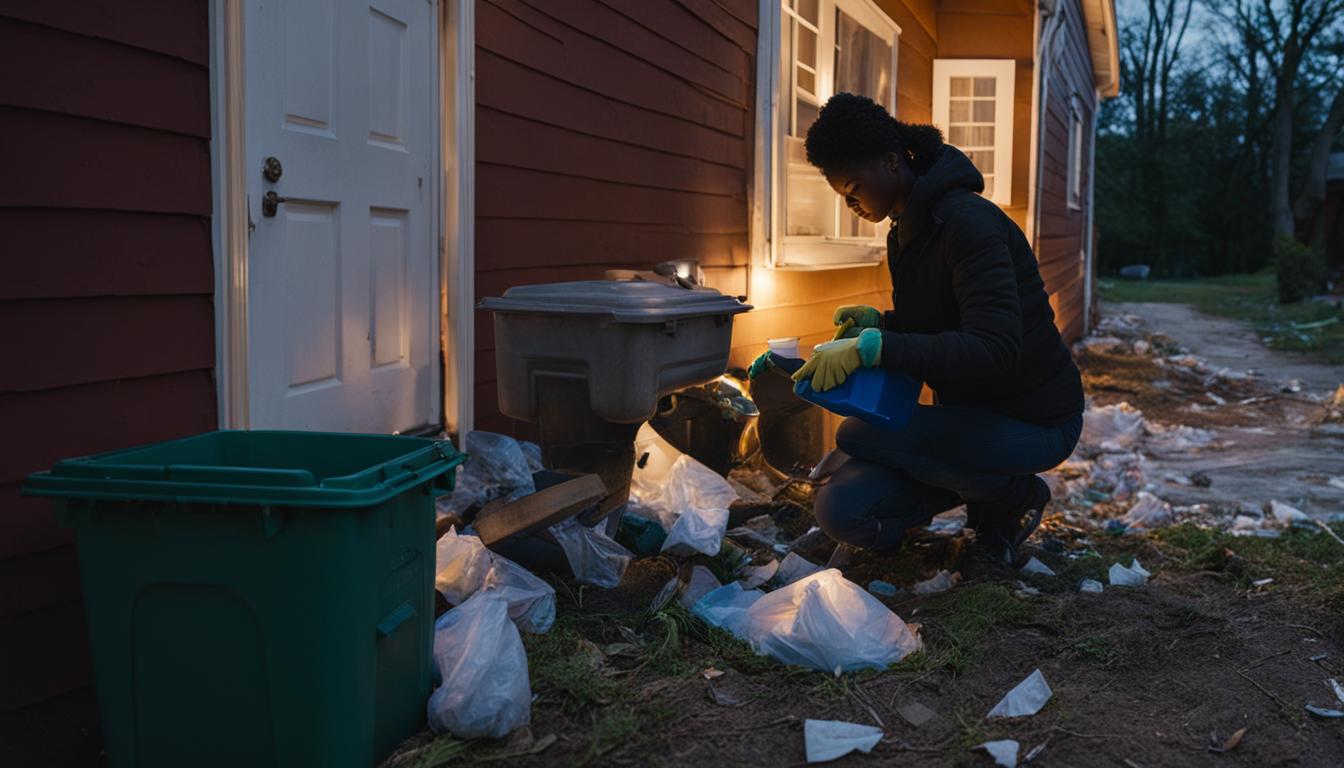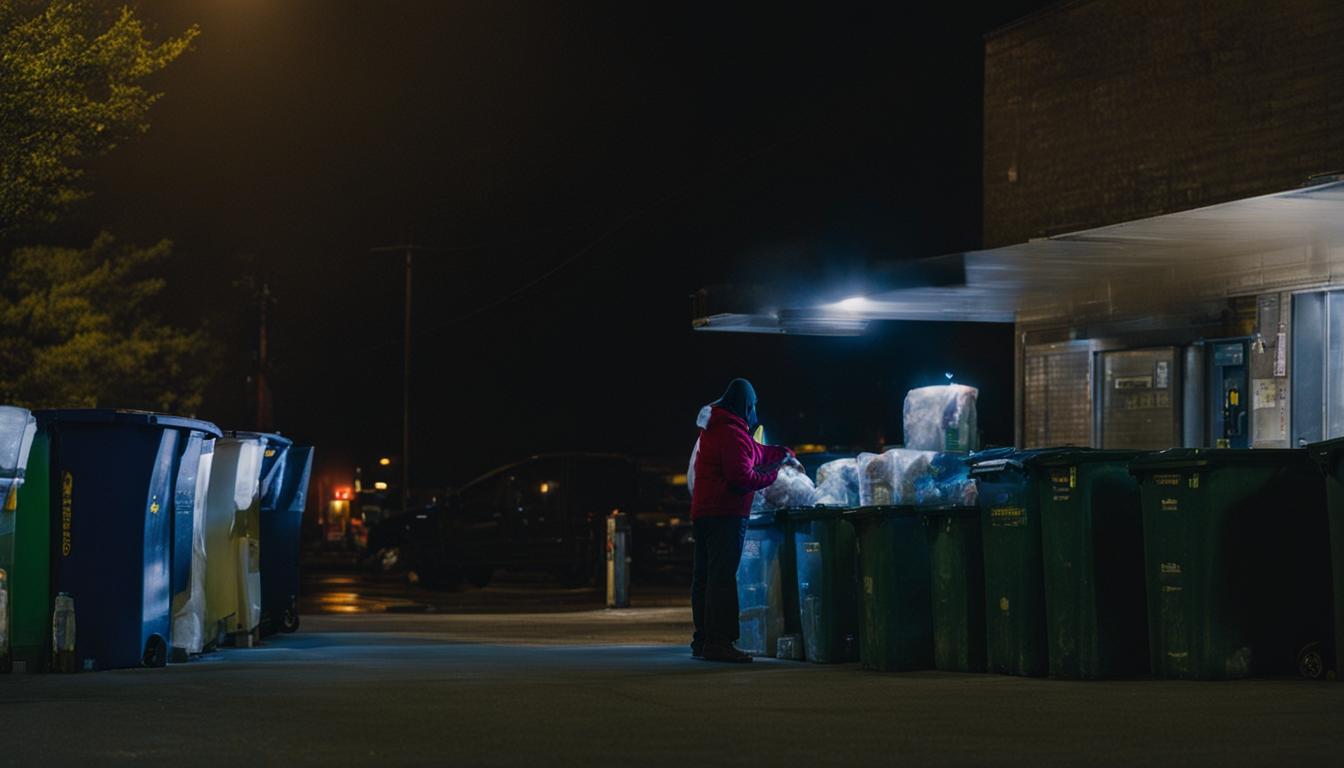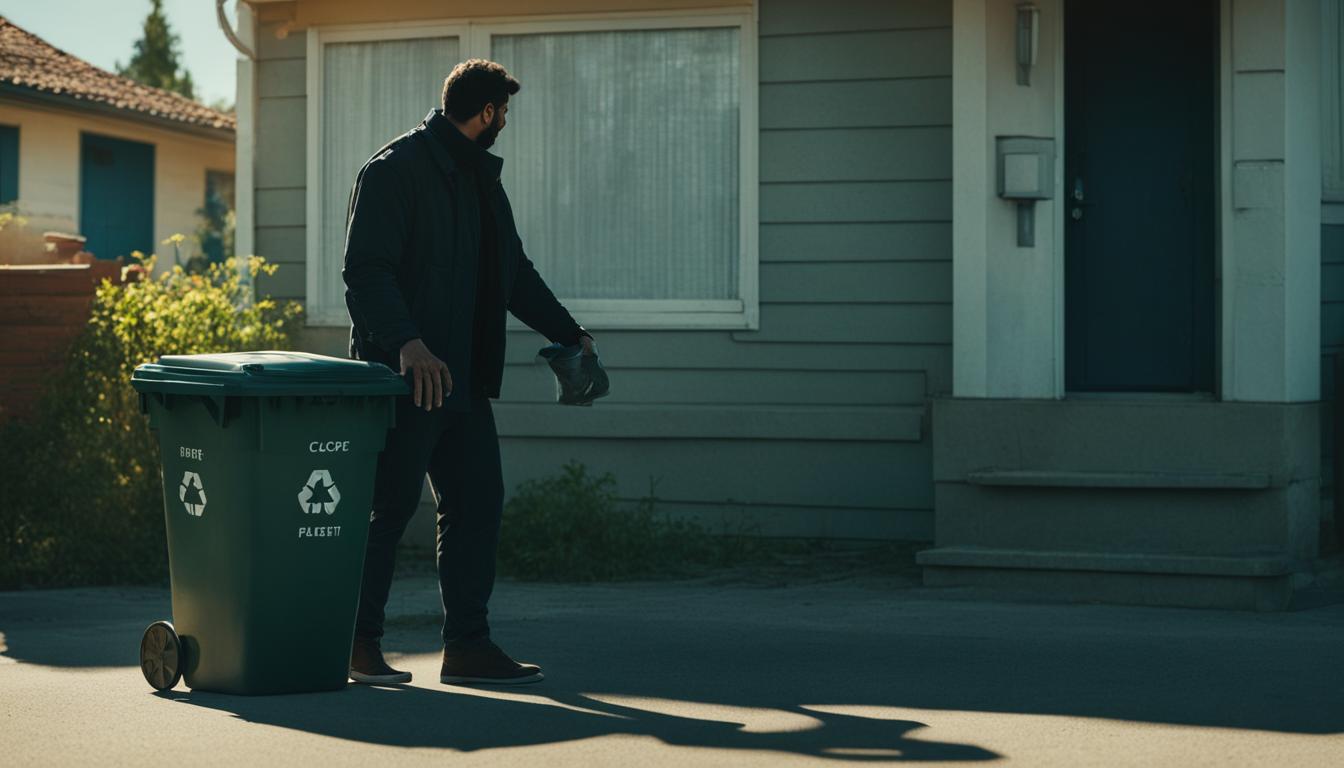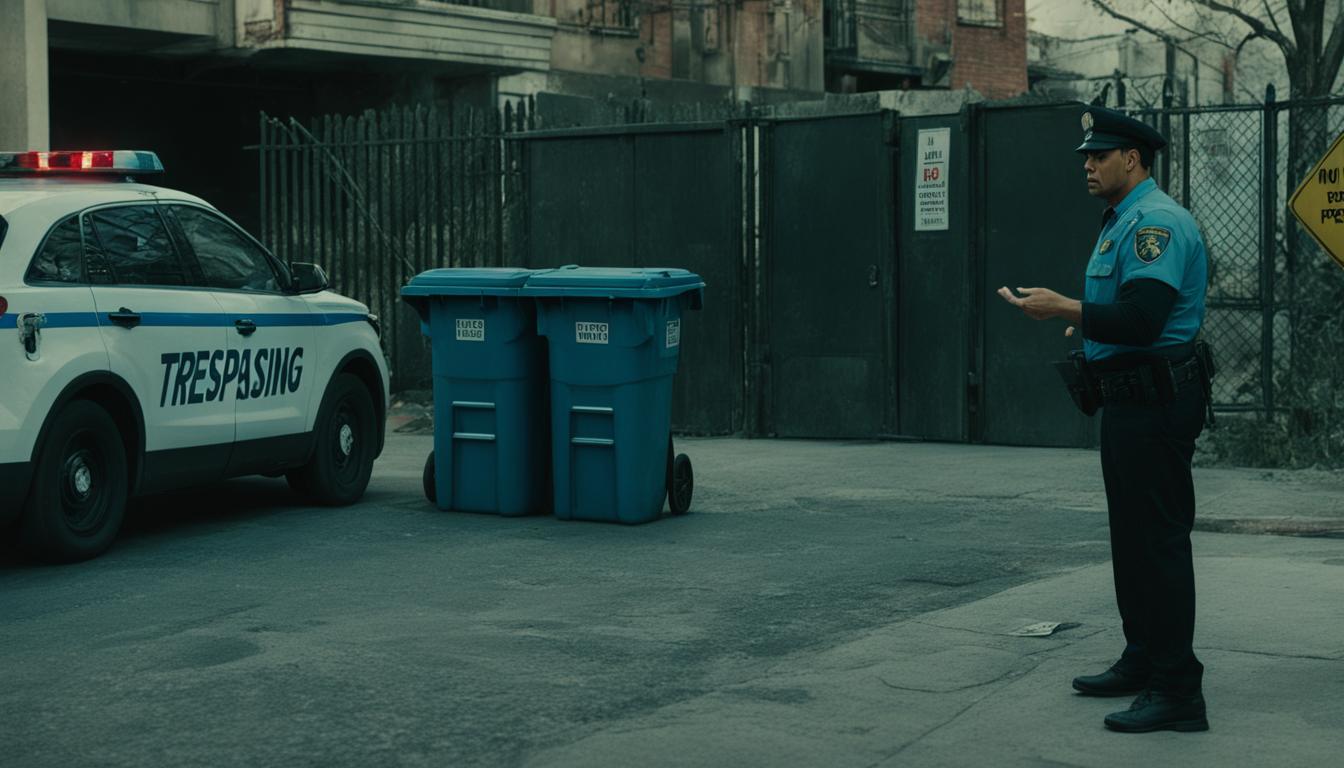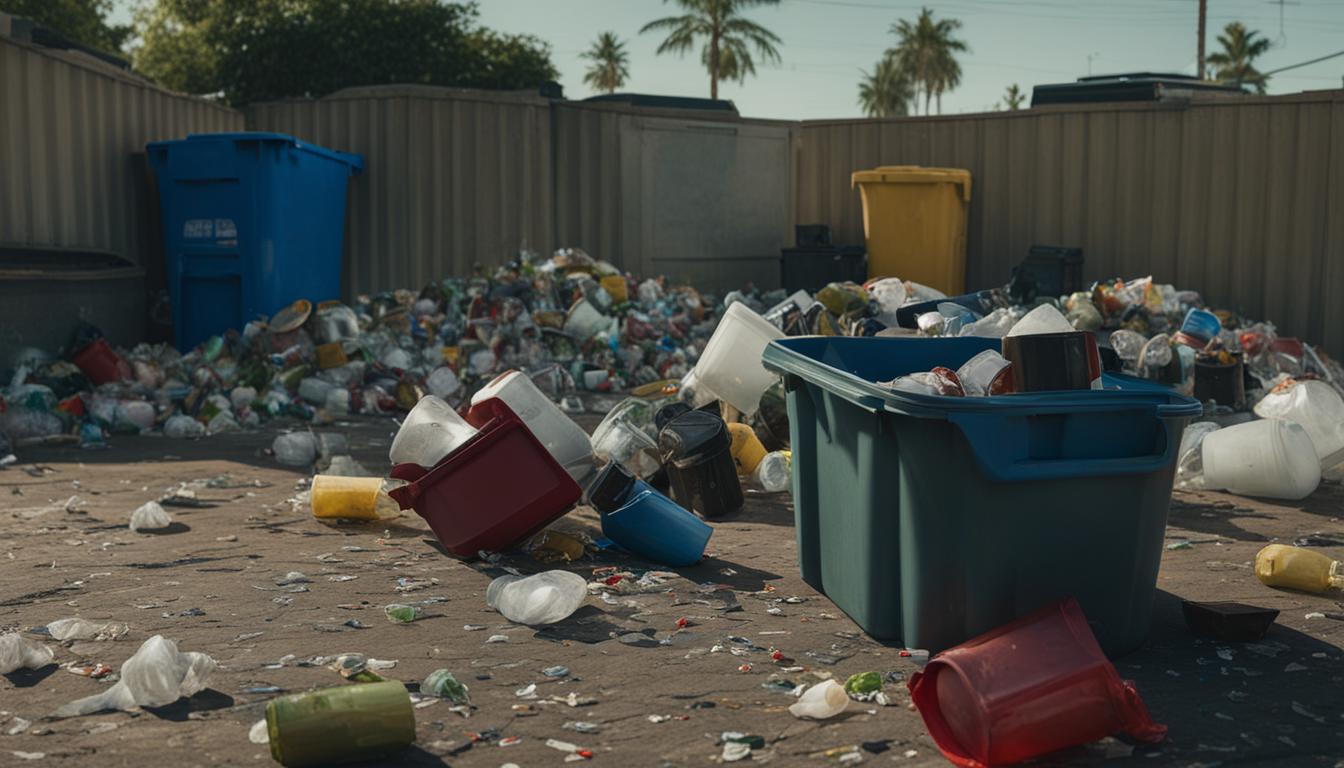Disclosure: This Post Contains Affiliate Links; We earn a commission on purchases.
Dumpster diving, or the act of going through someone’s trash to search for discarded items, is a practice that raises questions about its legality. In the state of Rhode Island, scavenging from recycling bins is prohibited by local ordinance in most cities and towns. Rhode Island general law states that municipalities may allow private and volunteer collection of recyclables, but it does not require them to do so. The Rhode Island Resource Recovery Corporation sells recycled materials on behalf of the municipalities, contributing to their revenue. Stealing from recycling bins deprives cities and towns of this income, making it illegal. However, there are no laws in Rhode Island that specifically prohibit dumpster diving in general. It is important to note that while dumpster diving itself may not be illegal, trespassing laws and city or municipal policies must be followed.
Key Takeaways:
- Dumpster diving in Rhode Island is legal as long as it is not done in recycling bins.
- Municipalities in Rhode Island have the authority to allow or prohibit dumpster diving.
- Trespassing laws and city/municipal policies must be followed when engaging in dumpster diving.
- Stealing from recycling bins is illegal and deprives cities and towns of revenue generated from recycled materials.
- Research and understand the specific regulations of the city or municipality before engaging in dumpster diving.
Rhode Island Dumpster Diving Regulations
In Rhode Island, dumpster diving itself is not explicitly illegal. However, it is important to be aware of the regulations surrounding dumpster diving to avoid potential legal issues, particularly related to trespassing on private property.
While there are no specific laws prohibiting dumpster diving in Rhode Island, trespassing laws apply to private property. Without permission from the property owner, going through someone’s trash can be considered trespassing. This includes both businesses and private dwellings. If dumpster diving is attempted without permission or in disregard of a “No Trespassing” sign, the person can face charges of trespassing.
Additionally, it is crucial to be mindful of any municipal boundaries or city codes that may restrict dumpster diving in certain areas. Researching and understanding the specific regulations of the city or municipality you are in is essential before engaging in dumpster diving to ensure compliance with local laws.
By respecting private property rights and adhering to the applicable regulations, individuals can engage in dumpster diving responsibly and legally in Rhode Island.
Key Points:
- Dumpster diving is not explicitly illegal in Rhode Island.
- Trespassing laws apply to private property, and dumpster diving without permission can be considered trespassing.
- Research and understand the specific regulations of the city or municipality before engaging in dumpster diving.
| Potential Legal Issues | Consequences |
|---|---|
| Trespassing on private property | Fines up to $500 per offense Imprisonment for up to 30 days |
| Chronic violations of dumpster diving laws | Fines of at least $50 per offense, up to a maximum of $600 per offense Imprisonment for up to six months per offense |
Dumpster Diving Locations in Rhode Island
Rhode Island provides a wealth of opportunities for dumpster diving enthusiasts. Whether you’re searching for hidden treasures or valuable resources, there are various locations across the state worth exploring. From shopping malls to construction sites, here are some of the best places to engage in dumpster diving in Rhode Island:
Shopping Malls
Diving into dumpsters found in popular shopping malls can yield a diverse range of discarded items. Some notable malls in Rhode Island for dumpster diving include:
- Cumberland Hill
- Greenville
- Valley Falls
- Cranston
- Newport East
These retail hubs often dispose of various products, including clothing, electronics, cosmetics, and more.
Construction Sites
Construction sites offer another exciting opportunity for dumpster diving in Rhode Island. These sites often discard materials like wood, metal, or tools that can be repurposed or sold. However, it is important to exercise caution and ensure that you have permission to access these areas.
Other Potential Locations
In addition to shopping malls and construction sites, there are other places where dumpster diving can be fruitful. Consider exploring:
- Garage sales
- Clothing stores
- Cosmetic stores
- Electronics and hardware shops
These locations often discard items that can be valuable to dumpster divers.
Remember to stay informed about any municipal boundaries or restrictions in the areas you plan to explore. Respecting these regulations will contribute to a positive dumpster diving experience in Rhode Island.
| Location | Items commonly found |
|---|---|
| Cumberland Hill Shopping Mall | Clothing, electronics, accessories |
| Greenville Shopping Mall | Household items, furniture, books |
| Valley Falls Shopping Mall | Electronics, personal care products |
| Cranston Shopping Mall | Furniture, home decor, appliances |
| Newport East Shopping Mall | Clothing, accessories, electronics |

Explore these prime dumpster diving locations in Rhode Island and unleash your inner treasure hunter!
Making Money from Dumpster Diving in Rhode Island
Dumpster diving can be a lucrative venture in Rhode Island, providing an opportunity to earn extra income. While it may be challenging to turn it into a full-time job, dedicated individuals can generate a significant amount of money through smart strategies and persistence.
One of the key approaches to making money from dumpster diving is by focusing on finding recyclable items. These items, such as aluminum cans, glass bottles, and scrap metal, can be sold to recycling centers or scrap yards for a profit. By collecting and accumulating a large volume of recyclables, dumpster divers can maximize their earnings.
Alternatively, some individuals prefer to search for valuable items like electronics, furniture, or books that can be resold online. These items can be found in dumpsters behind electronics stores, furniture retailers, or even residential areas. By cleaning, repairing, and listing these items on platforms such as eBay or Craigslist, dumpster divers can reach a broader customer base and increase their chances of making a sale.
The amount of money one can make from dumpster diving depends on various factors, including the amount of time dedicated to the activity and the quality of the items found. Full-time dumpster divers in Rhode Island have reported earning up to $3,600 per month by dedicating 40+ hours per week to the practice. However, it is important to note that financial success may vary depending on location, competition, and personal efforts.
While it may be enticing to pursue dumpster diving as a full-time job, it is crucial to consider some potential challenges. The unpredictable nature of dumpster contents, the need for physical labor, and the requirement to constantly search for new dumpsters can make it difficult to sustain a consistent income. Therefore, it is advisable to approach dumpster diving as a supplemental source of income rather than relying on it as a sole profession.
Takeaways:
- Dumpster diving can provide an opportunity to make money in Rhode Island.
- Focus on finding recyclable items or valuable items for resale.
- Income from dumpster diving depends on the time dedicated and the quality of items found.
- Consider potential challenges and manage expectations to avoid relying on dumpster diving as a full-time job.
In Their Words:
“Dumpster diving has allowed me to earn a decent income on the side. By focusing on finding valuable items that I can resell online, I’ve been able to cover my bills and even have some extra cash. However, it’s important to approach it with realistic expectations and be prepared for the physical labor involved.” – Emily, a Rhode Island dumpster diver.
Dumpster Diving and the Law in Rhode Island
Dumpster diving itself is not illegal in Rhode Island. However, it’s important to be aware of certain actions associated with dumpster diving that can lead to legal consequences. Violating trespassing laws or searching through trash while it is still on private property may result in legal issues. It’s crucial to familiarize yourself with the laws and ordinances specific to the city or municipality where you plan to engage in dumpster diving.
Dumpsters located on public property, such as those used for garbage pickup, are generally considered fair game for dumpster diving. In fact, a landmark Supreme Court case, California v. Greenwood, established that trash placed in public dumpsters is considered abandoned property and can be legally accessed by anyone.
When practicing dumpster diving in Rhode Island, it’s essential to understand the legality of the action. It’s recommended to research and familiarize yourself with the local laws, regulations, and restrictions to avoid any potential legal consequences. By staying informed and abiding by the law, you can engage in dumpster diving responsibly.
Familiarize Yourself with Local Laws
To engage in dumpster diving legally, it’s crucial to understand the specific laws and ordinances of the city or municipality you are in. Be aware of any restrictions or boundaries that may apply to dumpster diving in certain areas. By educating yourself about the local regulations, you can ensure that you are practicing dumpster diving within the bounds of the law.
Ensuring Compliance with Private Property Laws
While dumpster diving itself may not be illegal, it’s important to respect private property laws. Without permission from the property owner, going through someone’s trash can be considered trespassing. Businesses and private dwellings are considered private property, and attempting to dumpster dive without permission or despite “No Trespassing” signs can result in legal consequences.
In order to avoid any legal issues, it’s recommended to obtain permission from property owners before engaging in dumpster diving on private property. By respecting private property laws, you can ensure a legal and responsible dumpster diving experience.
Potential Penalties for Dumpster Diving Offenses
Violating the laws and regulations related to dumpster diving in Rhode Island can result in penalties. For individuals found in violation of these laws, fines can range up to $500 per offense and may also include imprisonment for up to 30 days. Chronic violators, those who have been found in violation of dumpster diving laws on three or more occasions within a 12-month period, can face fines of at least $50 per offense, up to a maximum of $600 per offense, and imprisonment for up to six months per offense.
It is crucial to understand the potential penalties associated with dumpster diving and to comply with all relevant laws and regulations.
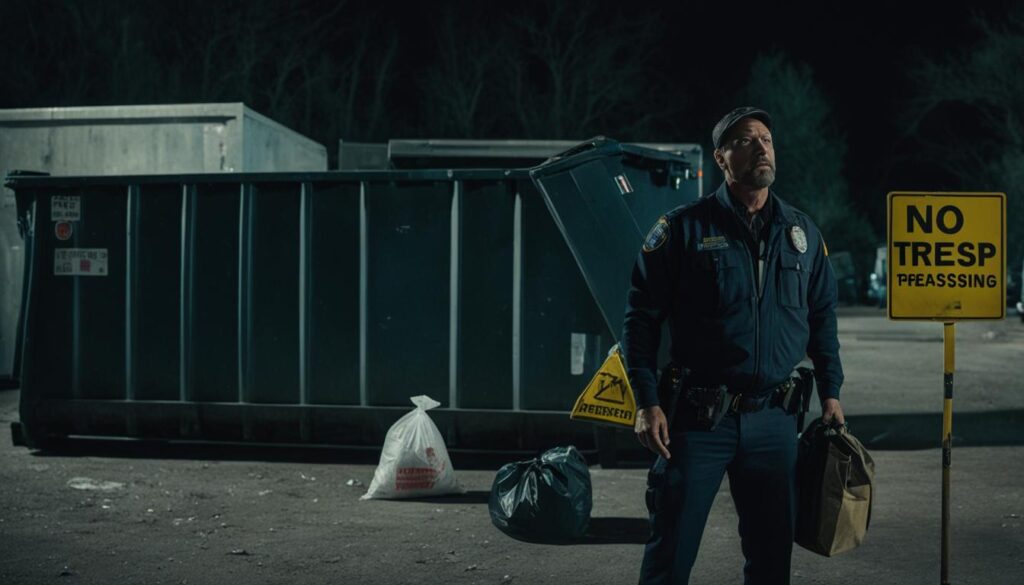
Examples of Penalties:
| Offense | Fine | Imprisonment |
|---|---|---|
| Individual violation | $500 | Up to 30 days |
| Chronic violator (three or more offenses) | At least $50 per offense Up to $600 per offense | Up to six months per offense |
Note: The above table provides an example of potential penalties and is not an exhaustive list. The actual penalties may vary depending on the specific circumstances and the discretion of the law enforcement authorities.
Conclusion
Dumpster diving in Rhode Island is a practice that raises questions about its legality. While there are no specific laws prohibiting dumpster diving itself, there are important legal factors to consider. Trespassing laws, municipal boundaries, and city codes must be respected to avoid potential legal consequences.
It is crucial for individuals engaging in dumpster diving in Rhode Island to obtain permission from property owners and comply with all regulations. Additionally, stealing from recycling bins is strictly prohibited as it negatively impacts the revenue generated by the recycling system in the state.
By understanding and adhering to the local laws and regulations, individuals can engage in dumpster diving responsibly and within the bounds of the law. It is important to approach dumpster diving with respect for private property and the environment, as well as to contribute to a sustainable and legal practice.
Source Links
- https://www.providencejournal.com/story/entertainment/house-home/2013/07/13/20130712-trash-tutorial-rummaging-through-trash-and-recyclables-is-prohibited-in-r-i-ece/35408149007/
- https://bizarrehobby.com/rhode-island-dumpster-diving/
- https://www.woonsocketri.org/solid-waste-department/files/chapter-10-garbage-trash

Subscribe to Our Newsletter

